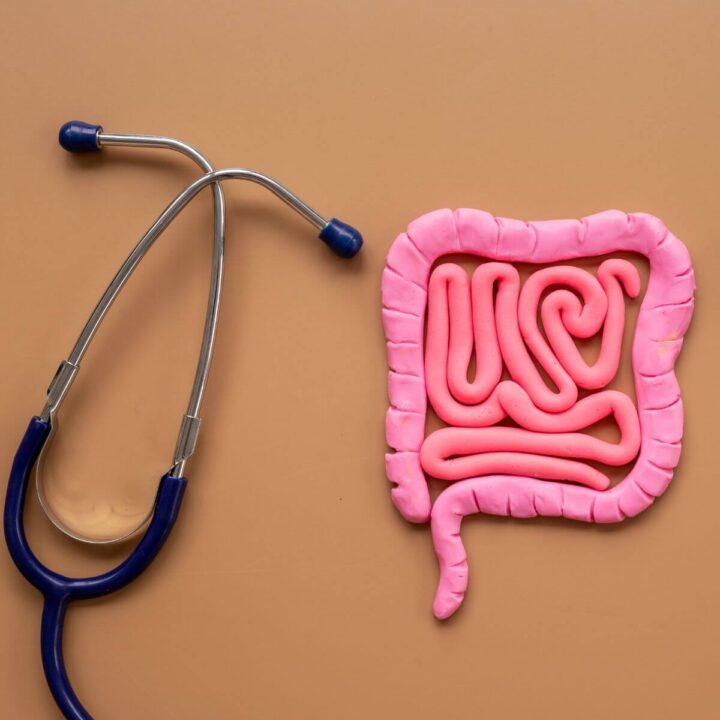Recognizing the signs of gut problems is crucial for maintaining overall health, as gut issues can manifest in surprising ways beyond digestion. In this article, we'll explore the 10 signs of an unhealthy gut to help you spot the symptoms of poor gut health and understand how to restore balance to your digestive system problems for a healthier, happier you.

Jump To:
🦠 Recognizing The Importance Of Gut Health
Gut health has become a popular wellness topic-and for good reason. The gut is central to our overall well-being, influencing not just digestion but also immunity, mood, and even the health of our skin and joints.
While an upset stomach might be an obvious indicator, there are many subtle signs of a bad gut that often go overlooked. From unexplained fatigue to unexpected skin issues, signs of bad gut health can appear throughout the body, impacting everything from mood to immunity.
Many symptoms of an unhealthy gut can go unnoticed or may appear unrelated to gut health, so recognizing them is the first step to improving your health. This article will dive into the 10 signs of an unhealthy gut and how to restore balance.
🔥 Understanding Gut Health and Inflammation
Gut health largely revolves around the balance of good and bad bacteria in your digestive tract. When this balance is disrupted, it can lead to inflammation, often triggering systemic inflammation-a chronic, body-wide inflammation that contributes to many health problems.
In fact, signs of bad gut health may manifest in ways far beyond digestive discomfort.

✅ 10 Signs Of An Unhealthy Gut
Let's explore the 10 common signs of an unhealthy gut and understand why these symptoms may be red flags for gut problems.
1. Skin Issues
Skin problems like eczema, psoriasis, and acne aren't just skin-deep. They can be signs of underlying gut imbalances. Research has shown a strong connection between gut health and skin conditions due to inflammation.
The gut-skin axis is a pathway through which gut health can impact skin. When the gut lining is damaged or inflammation is present, toxins may leak into the bloodstream, causing inflammation and skin issues.
2. Fatigue
Do you often feel sluggish and low on energy, no matter how much sleep you get? Chronic fatigue is a common sign of poor gut health. The gut is involved in nutrient absorption, and if it's unhealthy, you may not be absorbing nutrients efficiently, which can lead to deficiencies and low energy levels.
Additionally, gut bacteria play a role in producing serotonin, which is a neurotransmitter crucial for mood and energy.
3. Joint Pain
Joint pain and arthritis can stem from gut-related inflammation. When gut health is compromised, it can lead to chronic inflammation that affects the joints, making symptoms worse for those with arthritis or inflammatory joint conditions.
This link between the gut and joints is part of the gut-joint axis and underscores the importance of gut health in managing joint pain.
4. Mood Disorders
The gut-brain axis is a well-studied pathway connecting gut health with mental well-being. Imbalances in gut bacteria or inflammation in the gut can disrupt this connection, leading to mood disorders such as anxiety and depression. Studies have shown that the gut produces neurotransmitters like serotonin and dopamine, which play critical roles in regulating mood.
5. Allergies and Sensitivities
An unhealthy gut can lead to an overactive immune system, which may result in food allergies or sensitivities. If you find yourself suddenly sensitive to certain foods or if allergies seem to worsen, it may be a sign of a bad gut.
The gut plays a role in immune regulation, and when it's imbalanced, the immune system may react inappropriately to certain foods.
6. Sleep Disturbances
Gut health impacts sleep quality, as shown in studies linking sleep disturbances with gut issues like irritable bowel syndrome (IBS) and inflammatory bowel disease (IBD).
Poor gut health can disrupt the production of melatonin, a hormone essential for sleep regulation. If you're experiencing insomnia or irregular sleep patterns, this could be a sign of gut problems.

7. Weight Changes
Unexplained weight loss or gain may be linked to poor gut health. When the gut is out of balance, it can affect nutrient absorption, metabolism, and appetite regulation. Weight gain can occur due to inflammation-induced cravings for unhealthy foods, while weight loss may be the result of malabsorption of essential nutrients.
8. Frequent Infections
Your gut plays a central role in immune function, with around 70% of your immune system residing in the gut. Frequent infections, colds, or illnesses may indicate that your immune defenses are weakened due to poor gut health.
A healthy gut is crucial for fighting off pathogens, and if you're getting sick often, it might be time to focus on improving your gut health.
9. Digestive Discomfort
While gut-related symptoms aren't always digestive, some of the most obvious signs of gut problems are digestive in nature. Bloating, gas, diarrhea, and constipation are all potential indicators of poor gut health. Digestive discomfort suggests an imbalance in gut bacteria or other issues affecting gut function.
10. Sugar Cravings
Craving sugar regularly may be a subtle sign that your gut bacteria are imbalanced. Harmful bacteria and yeast in the gut thrive on sugar, and when they dominate, they can trigger cravings to maintain their growth.
📥 GET THIS RECIPE IN YOUR INBOX 📥
Addressing gut health through a balanced diet can help manage these cravings and support healthy gut flora.

⁉️ How to Improve Gut Health
If you recognize some of these symptoms, it's time to focus on nourishing your gut. Here are steps to help restore balance.
1. Prioritize Whole, Fiber-Rich Foods
Eating a diet rich in whole foods, especially high-fiber fruits and vegetables, supports a healthy gut microbiome. Fiber acts as food for beneficial bacteria, helping to promote balance and reduce inflammation.
2. Include Fermented Foods
Fermented foods like yogurt, kimchi, sauerkraut, and kefir contain probiotics-beneficial bacteria that can improve gut health. Including these foods in your diet can help increase the diversity of your gut microbiome, which is essential for overall health.
3. Manage Stress
Chronic stress can negatively impact gut health, contributing to symptoms like digestive discomfort and inflammation. Activities like meditation, yoga, and deep breathing can help manage stress and, in turn, benefit your gut.
4. Stay Hydrated
Water is essential for digestion and nutrient absorption. Staying hydrated can help prevent constipation and support the mucosal lining of the intestines, which protects against pathogens and promotes a healthy gut barrier.

5. Limit Sugar and Processed Foods
High sugar intake feeds harmful gut bacteria, creating an imbalance that can lead to inflammation and symptoms of bad gut health. Minimizing processed foods and sugar can help promote beneficial bacteria.
6. Get Enough Sleep
Prioritize quality sleep to support gut health. Poor sleep can disrupt the gut microbiome, while a healthy gut can help regulate sleep patterns, creating a positive feedback loop. Aim for 7-8 hours of sleep per night.
7. Consider Taking a Probiotic Supplement
While not a replacement for a healthy diet, a high-quality probiotic supplement can help repopulate your gut with beneficial bacteria, particularly after antibiotic use.
Good Gut health Is Essential For Overall Wellness
Maintaining good gut health is essential for overall wellness. From mood and immune health to skin and joint health, the signs of gut health issues may extend far beyond the digestive tract.
If you recognize several of these signs of an unhealthy gut, taking steps to balance your gut microbiome can bring positive changes to your health.

🗣️ Let's Discuss Signs of Poor Gut Health
So, have you tried any of these gut health tips before to help fix your poor gut health? Let me know your personal experience below.
You can also connect with me @EatYourNutrition on Instagram. I love seeing your photos. #EatYourNutrition #LauraVillanueva
👉 Additional Resources
Also, for further reading and guidance on how to support your gut health, check out some of my resources below.
Suspect you have a gut imbalance or simply want to improve your gut and hormone health. Download my guide, 10 Ways to Repair Your Gut Health.
- Program: Join my Restore Your Gut Health Fundamentals Program. Register today.

- Meal Plan: Want a simple recipe guide and gut healthy meal plan packed with the key to help get your gut health back on track? Order this meal plan and recipes inside the Gut Health Reset Meal Plan.
- Group Support: Join my Featured Nutrition Challenge. All seasonal nutrition challenges come with a meal plan, recipe guide, grocery shopping list, and a seasonal featured nutrition theme.




















Comments
No Comments